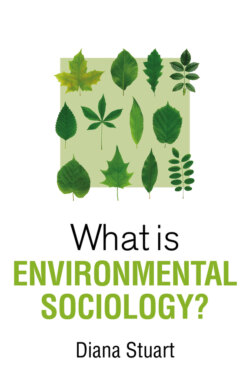Читать книгу What is Environmental Sociology? - Diana Stuart - Страница 6
1 Environmental Sociology: In Uncharted Waters
ОглавлениеEnvironmental sociology is a subdiscipline of sociology that examines the relationships between humans and the entities and processes on Earth that are often lumped together and referred to as “nature” or “the environment.” Dominant philosophical views from the past fortified the use of such terms to refer to what lies outside of the human or social world. In other words, we humans are here in society and “nature” or “the environment” is somewhere else, out there. However, as scientists, philosophers, environmentalists, and many others increasingly have realized, the idea of a separation between nature and society is far from accurate. We must also acknowledge that both “nature” and “society” represent complicated configurations of beings and entities and are concepts that are diverse, complex, and socially constructed.
If there is something called “the environment,” then we live in it, depend on it, and are a part of it. It is where we live, work, and recreate. It includes all life, plant and animal, as well as nonliving things such as soil, rocks, water, and atmosphere. While some who want to protect “the environment” might be thinking only about the nonhuman world, our inherent relationships and dependencies make humans a part of the biophysical community. The idea of a divide between nature and society has perniciously masked these fundamental linkages. The belief that we can take resources from “the environment” and put waste into “the environment” without any consequences is not only false, but dangerous. The long-ignored interconnections between the human and nonhuman worlds are now clear, as environmental impacts directly affecting humans have increased over time. In response to these impacts, environmental sociology emerged in the 1970s to better understand these overlooked relationships.
While environmental sociology emerged over forty years ago, this book focuses on more recent definitions and applications. Gould and Lewis (2009: 2) define environmental sociology as “the study of how social systems interact with ecosystems.” Lockie (2015: 140) defines environmental sociology as “the application of our sociological imaginations to the connections among people, institutions, technologies and ecosystems that make society possible.” In both of these definitions is the term ecosystem, which refers to all living organisms in a community, the nonliving components of this community, and their relationships. While humans affect ecosystems and ecosystems affect humans, a more accurate depiction is that humans depend on ecosystems, live in ecosystems, and are also driving rapid ecosystem change. With accelerating climate change and biodiversity loss, it has become clear that human activities now shape the fate of all species on the planet. Therefore, as a field of study, environmental sociology examines how humans interact with the nonhuman beings, entities, and processes on Earth and how these relationships shape our mutual existence, survival, and possibilities for flourishing.
